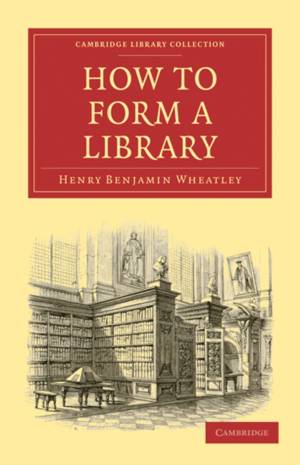
Je cadeautjes zeker op tijd in huis hebben voor de feestdagen? Kom langs in onze winkels en vind het perfecte geschenk!
- Afhalen na 1 uur in een winkel met voorraad
- Gratis thuislevering in België vanaf € 30
- Ruim aanbod met 7 miljoen producten
Je cadeautjes zeker op tijd in huis hebben voor de feestdagen? Kom langs in onze winkels en vind het perfecte geschenk!
- Afhalen na 1 uur in een winkel met voorraad
- Gratis thuislevering in België vanaf € 30
- Ruim aanbod met 7 miljoen producten
Zoeken
Omschrijving
Henry Benjamin Wheatley (1838-1917) was a prolific writer on bibliography, literature and the arts. As founder of the Index Society, and editor of The Bibliographer, he was also involved in the foundation of the Library Association. In that context he wrote several works on library topics. How to Form a Library was published in 1886, when libraries were spreading rapidly throughout England. The book provides advice on the selection of material for different kinds of libraries and audiences, and suggests a list of core works. Although the choices reflect the period in which it was written - a point Wheatley makes about earlier lists - it nonetheless has a value in giving insight into the intellectual interests of the day. He was firmly against librarians acting as moral censors, and although his list of required reading is unlikely to be followed today, the book contains much valuable information on library history.
Specificaties
Betrokkenen
- Auteur(s):
- Uitgeverij:
Inhoud
- Aantal bladzijden:
- 264
- Taal:
- Engels
- Reeks:
Eigenschappen
- Productcode (EAN):
- 9781108021494
- Verschijningsdatum:
- 21/10/2010
- Uitvoering:
- Paperback
- Formaat:
- Trade paperback (VS)
- Afmetingen:
- 140 mm x 216 mm
- Gewicht:
- 340 g

Alleen bij Standaard Boekhandel
+ 128 punten op je klantenkaart van Standaard Boekhandel
Beoordelingen
We publiceren alleen reviews die voldoen aan de voorwaarden voor reviews. Bekijk onze voorwaarden voor reviews.









